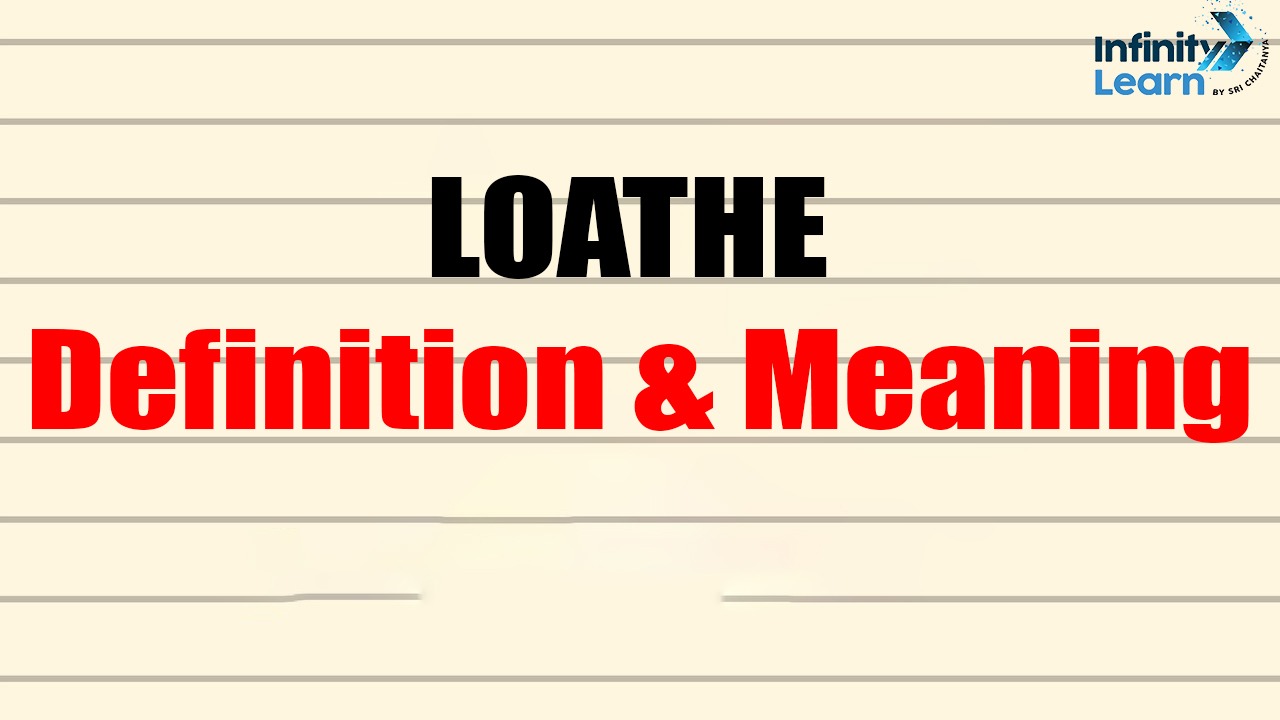Table of Contents
Loathe Meaning: Loathe is a powerful verb in the English language, used to express intense dislike or disgust for someone or something. It goes beyond mere disapproval or dislike, delving into the realm of deep-seated aversion. In this blog, we will explore the nuances of “loathe,” including its definition, pronunciation, common confusions with “loath,” and synonyms and antonyms. By the end, you will have a comprehensive understanding of this potent word and how to use it effectively in your writing and speech.

Loathe Meaning and Definition
“Loathe” is defined as “to feel intense dislike or disgust for.” This definition succinctly captures the essence of the word, emphasizing the strong emotional response it elicits. Britannica’s definition aligns with common usage and provides a clear understanding of the intensity behind the word “loathe.”
How to Pronounce “Loathe”
The pronunciation of “loathe” is relatively straightforward but important to master to ensure clear communication. It is pronounced as /loʊð/, with the “o” sounding like the “o” in “go,” and the “th” resembling the voiced “th” in “this.” Practicing this pronunciation will help you use the word confidently in conversation.
Loath or Loathe?
A common point of confusion in English is the difference between “loath” and “loathe.” Despite their similar spellings, these words have distinct meanings and uses.
- Loathe: As mentioned, “loathe” is a verb meaning to feel intense dislike or disgust for something. For example, “I loathe waking up early on weekends.”
- Loath: On the other hand, “loath” is an adjective meaning unwilling or reluctant. For example, “She was loath to admit her mistake.”
Understanding the difference between these two words is crucial to avoid miscommunication. Remember, if you want to express extreme dislike, use “loathe.” If you mean unwilling or reluctant, “loath” is the word you need.
Synonyms & Antonyms for “Loathe”
To enrich your vocabulary and express nuanced emotions, it’s helpful to know synonyms and antonyms for “loathe.”
Synonyms for Loathe
- Detest: To dislike intensely.
Example: “She detests the smell of garlic.” - Abhor: To regard with disgust and hatred.
Example: “He abhors violence of any kind.” - Despise: Experiencing Profound Disdain or Intense Aversion.
Example: “They despise deceit in all forms.” - Hate: To feel intense or passionate dislike for.
Example: “I hate waiting in long lines.”
Antonyms for Loathe
- Love: To feel deep affection for.
Example: “She enjoys spending quality time with her family.” - Admire: To hold in high esteem or view with great appreciation.
Example: “He deeply respects her commitment to her profession.” - Like: To find agreeable, enjoyable, or satisfactory.
Example: “They like going to the beach.” - Cherish: To hold dear; to feel or show affection for.
Example: “We cherish our childhood memories.”
By using these synonyms and antonyms, you can convey varying degrees of dislike or preference, adding depth to your communication.
Loathe Meaning: Practical Usage of “Loathe”
To fully grasp the word “loathe,” it’s useful to see it in different contexts. Here are a few examples
1. Personal Dislikes
- “I absolutely loathe the smell of petroleum; it effects my mind”
- “He loathes the winter months because of the cold and the snow.”
2. Social Situations
- “Many people loathe waiting in long lines at the grocery store.”
- “She loathes being the center of attention at large gatherings.”
3. Professional Context
- “Employees loathe micromanagement and prefer to work autonomously.”
- “The project manager loathes the constant revisions of the design that derail the project timeline.”
Loathe Meaning: Enhancing Your Writing with “Loathe”
Incorporating “loathe” into your writing can add a layer of emotional intensity and specificity. Here are some tips to help you use the word more effectively:
- Be Specific: When using “loathe,” specify what or who is the object of this intense dislike to provide clarity and depth. For example, “She loathes waking up early” is more impactful than “She loathes mornings.”
- Show, Don’t Just Tell: Instead of simply stating that a character loathes something, show their reactions and behaviors to illustrate this feeling. For example, “He recoiled at the sight of spiders, his loathing evident in the way he quickly backed away” paints a vivid picture.
- Use in Dialogue: Incorporate “loathe” into dialogue to convey a character’s strong emotions. For example, “I absolutely loathe how you never listen to me!” can reveal conflict and tension in a conversation.
Loathe Meaning in Hindi
The English verb “loathe” translates to “घृणा करना” (ghṛiṇā karnā) in Hindi. This word conveys a strong sense of intense dislike or disgust towards someone or something. Let’s delve deeper into its usage and context.
Understanding “Loathe” (घृणा करना)
“Loathe” is used to describe a feeling of deep-seated aversion. When you loathe something, it means you have a powerful and intense dislike for it. This isn’t just a mild dislike; it indicates a significant emotional response.
Examples:
Food
English: “I loathe the taste of bitter gourd.”
Hindi: “मुझे करेला का स्वाद घृणास्पद लगता है।”
Behavior
English: “He loathes dishonesty.”
Hindi: “वह बेईमानी से घृणा करता है।”
Pronunciation
In Hindi, “घृणा करना” is pronounced as ghṛiṇā karnā. Here’s a breakdown:
- “घृ” sounds like “ghri”
- “णा” sounds like “naa”
- “करना” is pronounced as “karnā”
Conclusion
“Loathe” is a powerful word that conveys intense dislike or disgust. By understanding its definition, pronunciation, and the difference between “loathe” and “loath,” you can use this word accurately and effectively. Knowing its synonyms and antonyms also allows you to express a range of emotions in your communication. Whether in personal, social, or professional contexts, incorporating “loathe” into your vocabulary will enhance your ability to convey strong feelings and add depth to your language. Use it wisely to articulate your aversions with precision and impact.








